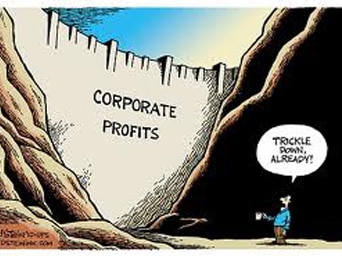by Sherwood Ross
Humanism has little place in U.S. global affairs these days when government acts as the enforcement arm of capitalism-run-amok.
Especially since WWII, Washington has habitually aligned itself with the goals of U.S. corporations to dominate. In Latin America and elsewhere, it has funded armies of goons that harass, batter, jail, and murder labor leaders and their allies. In Colombia, labor organizers that call a strike put their lives at risk. It’s a veritable shooting gallery where trade unionists are targets.
In Iraq, writes Noam Chomsky in “Interventions”(City Lights Books), the occupying forces broke into union offices, arrested leaders, and enforced Saddam Hussein’s antilabor laws. Union leaders were killed under mysterious circumstances. Concessions went to bitterly anti-union U.S. firms. New oil contracts went to firms whose executives were personal friends of President George W. Bush.
At home, U.S. corporations—which exhibit zero loyalty to their employees and to the cities that gave them all those tax breaks to locate—put profits first even if it means stripping those cities of their plants; even if it means throwing thousands of loyal staffers out of work; even if it means cheating taxpayers by relocating their headquarters’ offshore; even if it means hiring cheap foreign labor.
“We are seeing the Financial Elite of America waging class warfare against the ordinary working men and women of this country who have made it what it is today,” says University of Illinois international legal authority Francis Boyle.
And Noam Chomsky points in Imperial Ambitions(Metropolitan Books): “Corporations barely pay taxes. The corporate tax rate is already very low, but corporations have worked out an array of complicated techniques so they often don’t have to pay taxes at all.”
At the same time, he adds, “the general population has gone through 30 years(1975-2005) of either stagnation or decline in real wages, with people working longer hours with fewer benefits. I don’t think there’s been a period like this in American history.” Meanwhile, corporations harvest record profits.
As sociologist James Petras of Binghamton University points out in his “Rulers and Ruled in the US Empire,”(Clarity): “Today, over 50 percent of the top 500 US (multinational corporations) MNCs earn over half their profits from overseas operations…This tendency will accentuate as US MNCs relocate almost all their operations, including manufacturing, design and execution. They will employ low tech and high tech employees in their pursuit for competitive advantages and high rates of profits.” (This is not to say that some MNCs aren’t building schools, housing, highways, and public facilities near their overseas plants.)
Petras noted that Mexican President Carlos Salinas(1988-94) “privatized over 110 public enterprises, opened the borders to subsidized US agricultural exports—ruining over 1.5-million…farmers and peasants—and signed the North American Free Trade Agreement. His policies facilitated the US takeover of Mexico’s retail trade, real estate, agriculture, industry, banking and communications sectors. Similar patterns of foreign takeovers were evident throughout the region, especially in Ecuador, Chile, Peru, Bolivia and Colombia where lucrative gas, oil and mining firms were privatized and sold to foreign investors.”
“Oil and energy companies secured exploration rights via corruption by buying out entire ministries in Russia, Nigeria, Angola, Bolivia and Venezuela in the 1990s,” Petras writes. “Securing a toehold in any economic sector of China to exploit cheap labor requires the MNC to pay off a small army of government officials. This is more than compensated by the regime’s enforcement of a cheap labor regime, repression of labor discontent and the imposition of state-controlled pro-business ‘labor unions.’”
Everywhere one looks, Imperial America is training police departments of friendly dictators in brutal suppression techniques if and when the peasantry demands a bigger share of the pie which they baked. Journalist William Blum in “Rogue State”(Common Courage Press), U.S. armed forces “are being deployed in well over 100 countries in every part of the world,” countries Washington supplies “with sizable amounts of highly lethal military equipment, and training their armed forces and police in the brutal arts…”
It’s no coincidence that as arms become America’s No. 1 export, civilian jobs are going down the tubes. Columbia University economist Seymour Melman, interviewed in the Feb., 1992, issue of The Progressive, argued because of its vast expenditures for war the U.S. was “losing millions of productive jobs” in the civilian sector to foreign firms.
“The U.S. economy is in dramatic disrepair compared to Germany and Japan. By concentrating capital on civilian purposes for 45 years they’ve emerged as the true victors of the Cold War,” Melman said.
More recently, Chomsky wrote: “U.S. military expenditures approximate those of the rest of the world combined, while arms sales by 38 North American companies (one in Canada) account for over 60 percent of the world total.”
The record of history shows the White House has used CIA and Pentagon muscle to attack nations whose officials wouldn’t play ball in the capitalist league. President Eisenhower gave the green light for the 1953 CIA overthrow of Iran. President Kennedy attempted to overthrow Cuba, but failed, in 1961; President Nixon succeeded in overthrowing the legally elected president of Chile in 1973; and President Reagan funded the Contras to wage war against the leftist Sandinistas of Nicaragua.
“Because of Red Scare anxieties,” wrote James Carroll in “House of War”(Houghton Mifflin), “Americans would uncritically accept the maturing of an economic system (capitalism) that, in its effect if not its structure, condemned most of the world to crushing impoverishment. The humane aspects of Marx’s critique of capitalism would not be reckoned with in the United States, with dangerous consequences that define the ever more polarized twenty-first century.”
When Cold War presidents gazed upon the world, all they saw was Red. War hero Jimmy Doolittle, who led the first U.S. air strike against Japan in 1942, later as chairman of a special task force reported to President Dwight Eisenhower that the U.S. “must learn to subvert, sabotage, and destroy our enemies by more clever, more sophisticated, and more effective methods than those used against us. It may be necessary that the American people be made acquainted with, understand, and support this fundamentally repugnant philosophy.” That, of course, is precisely what happened. The end began to justify any means. The Pentagon even uses its listening devices to steal business information to give U.S. firms an edge over foreign ones.
Fear-mongering American politicians claimed that if just one country went Communist, all its neighbors would topple like dominoes. For decades, the U.S. subsidized anti-Communist Japanese politicians; the CIA secretly lined the pockets of mullahs and ayatollahs in Iran; and the Pentagon plunged recklessly into civil wars such as in Viet Nam using overwhelming force and violence. Ironically, at home the Justice Department, responding to the “Red Scare,” persecuted, tried, and jailed leaders of the U.S. Communist Party, for allegedly advocating the same strategies the Pentagon was actually employing on a massive scale the world over.
Yet all the Pentagon’s costly armaments designed to topple Red regimes proved less effective than the protests of the non-violent disciples of Gandhi, such as Solidarity labor union’s Lech Walesa in Poland, who led the break out of the Soviet orbit. In Russia, President Mikhail Gorbachev, the advocate of Glasnost, or openness, could see that Soviet-brand Communism was failing his people and began to make changes that permitted private ownership of business.
Similarly, strong-arm capitalism American-style today needs to be transformed. Starting wars to force other nations to privatize natural resources they would prefer to keep under public control is both reprehensible and criminal.
In his treatise “On Human Work” in 1981, Pope John Paul II called for “the primacy of the person over things and of human labour over capital as a whole.” Workers must be paid fairly, allowed to form unions and strike for self-improvement and treated with dignity and respect. Let it be.
Sherwood Ross is director of the Anti-War News Service from Coral Gables, Fla. He was active in the civil rights movement and later as a wire service columnist covering workplace issues. To contribute to his news service or comment, reach him at sherwoodross10@gmail.com.

Sherwood Ross is an award-winning reporter. He served in the U.S Air Force where he contributed to his base newspaper. He later worked for The Miami Herald and Chicago Daily News. He contributed a weekly column on working for a major wire service. He is also an editorial and book publicist. He currently resides in Florida.
ATTENTION READERS
We See The World From All Sides and Want YOU To Be Fully InformedIn fact, intentional disinformation is a disgraceful scourge in media today. So to assuage any possible errant incorrect information posted herein, we strongly encourage you to seek corroboration from other non-VT sources before forming an educated opinion.
About VT - Policies & Disclosures - Comment Policy



